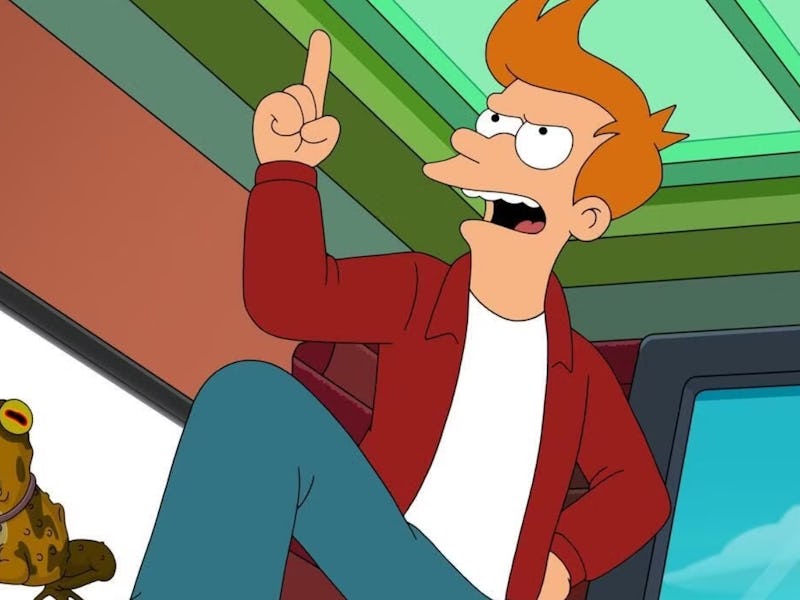Futurama Is Still Helping Us Face The Future
The 31st century remains distant, but we need Fry’s attitude right now.

We didn’t know it would be the last gasp of ‘90s optimism; all we knew was that, on this day in 1999, Philip J. Fry was cryogenically frozen, and creator Matt Groening gave us an iconic series with a staying power that’s rivaled that of The Simpsons.
Futurama followed delivery boy and classic lovable idiot Fry on his adventures in New New York 1,000 years in the future, a world unrecognizable to our own, yet not terribly different either. To rewatch the pilot and the early seasons that followed is to risk a few nostalgic pains along with the laughs, since indicators of all that ‘90s excitement for the new millennium are rampant.
Here’s to another lousy millennium.
That’s not to say that the satire didn’t take a turn for the dark and prescient before 2001. Writers kept plot twists safely within the realm of sitcom tropes while showing that the normalization of space travel and other technological advancements did little to slow the sheer volume of stupidity humanity was capable of.
While The Simpsons was already safely settled as a respectable TV mainstay, Futurama was young and hungry, and acted accordingly. So while Fry was making deliveries across the galaxy, there were detours that included a reanimated Nixon winning the presidency while ragging on the electorate — a development that screams prescience — and Earth attacking a foreign planet for no discernible reason.
But it was after 9/11 when Futurama snuck in some dark currents as the laughter swirled. There’s the spiritual questions of “Godfellas,” as Bender becomes a god to a race of tiny beings and completely fails at it, while “A Taste of Freedom” pries into the limitations of freedom of speech that include the destruction of the American flag, no small risk given the era’s brand of patriotism.
Futurama took a... unique approach to commenting on jingoism.
Throughout, Fry remains the perfect protagonist for all the journeys he bumbles in and out of. With his sweetly optimistic outlook and general kind-hearted nature, he has no problem winning our sympathies, especially as, within five minutes of the pilot, he gets called a loser, discovers his girlfriend is cheating on him, and has his bike stolen. When he wakes up in 2999, his reaction to realizing that he’ll never see everyone he’s ever known again is a hearty cheer.
Fry isn’t merely the show’s viewpoint character; he quickly becomes its heart. His wonder and shock at the aspects of life everyone else has long since taken for granted drives Futurama away from cynicism even when its humor is at its darkest, and his nearly unrelenting ability to look on the bright side is the glue that holds his eccentric workplace family together.
Despite critical popularity and a hardcore fanbase, Fox was often less than supportive of the show, with episodes aired unpredictably and the series canceled and then revived at several points. New episodes are currently hitting Hulu, and the show's jests at our expense are no less biting than before.
Momazon seems to be a reference to something...
Recently, for example, Futurama’s ruthless corporate villain, Mom, unleashed Momazon in the episode "Related to Items You've Viewed," and the consumer force soon grew to encompass the entire universe. It’s easy, Futurama points out, to hate on all-consuming companies like “Momazon,” but harder to avoid having them in your life.
How does the situation ultimately resolve itself? With the observation that “Everything will be exactly as bad as it's always been." Trust Futurama to make fun of our ability to consume our way to a dystopia, but with things not getting any worse being what passes for optimism now, it’s nice to know that Futurama will be with us for at least two more seasons. Despite everything, we need Fry’s upbeat attitude more than ever.